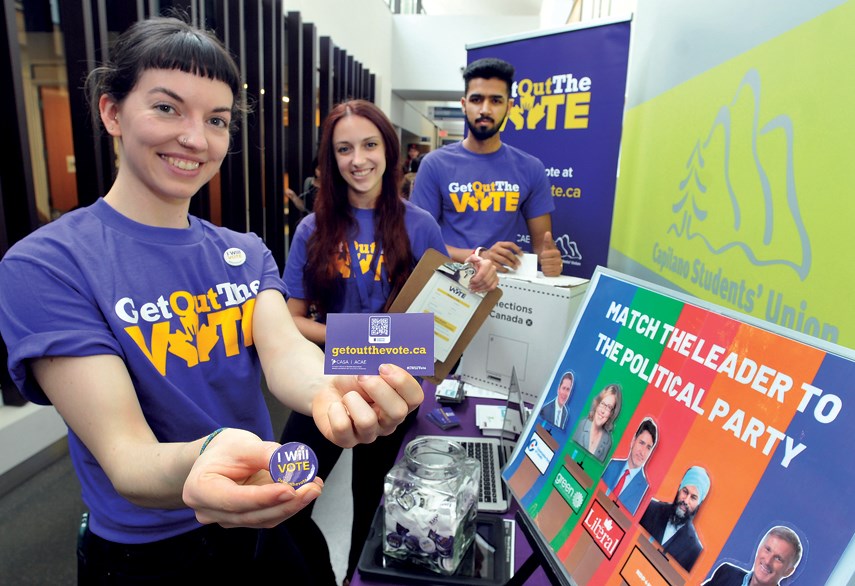The federal election call is expected at any time, but the Capilano Students’ Union isn’t waiting to make sure its young members leave a dent in the final results.
The CSU, in partnership with the Canadian Alliance of Student Association, has launched a Get Out the Vote campaign to make sure as many of their members as possible find their way into a voting booth on Oct 21.
“We want students to be engaged and we want students to recognize the power that their voice and their vote has in this upcoming election. It’s the first time that young people are the largest voting bloc,” said Emily Bridge, CSU president.
The CSU has deployed street teams to meet students on campus and get them to pledge to vote, either on paper or online at getoutthevote.ca. During the 2015, CASA netted 42,000 pledges, about 1,000 of which came from Cap Students. Bridge said she expects they can do even better this year.
“Democracy is only effective if everybody participates. We know that, traditionally, young people have been more disengaged from the political sphere, but we’re already noticing that’s not true anymore,” she said.
Elections Canada estimates the number of people in the 18-24 demographic who voted in the 2015 federal election jumped by 18.2 per cent, after years of trending downward.
“It just proves that young people are engaged. They do care about the issues and by voting, they can show the federal government and political parties they need to listen to young people and to the student voice,” Bridge said.
The campaign isn’t just intended to alert students to the opportunity to vote, but also to empower them to make their decision, Bridge said. The CSU has organized an all-candidates debate on campus on Sept. 30, with invites being sent to each of the candidates running in the North Vancouver riding. And they are offering students info on how to get registered and informed on the parties’ platforms, although the campaign itself is strictly non-partisan.
“Students care about lots of different issues. There isn’t any one issue that would define students,” Bridge said.
Capilano political science instructor David Matijasevich said he and other academics will be watching to see how the youth turnout impacts the election results, but he isn’t predicting the Liberals will inspire young people in quite the same way they did in 2015.
“I think part of that probably is because of disappointment perhaps in the Trudeau government and the promises he made that were appealing to young voters like electoral reform or his stance on the environment,” he said.
Although, he said, the “millennial” generation spans three different decades and the cohort voting for the first time now shows signs of bucking the downward trend.
“There are some people in the political science world who are arguing that this is a new type of era for young people. Young people are a lot more interested in politics than they were 10, 15 years back. Because of social media, politics is in the air a little bit more than it was 10 or 15 years ago,” he said.
Matijasevich said he expects multiculturalism to be a big issue among young voters, especially with the rise of right wing populism in the United States and Canada. And climate change will be “front and centre,” he added.
“And young people are going to really play a big role in deciding whether Canada is going to pursue that very seriously or not,” he said.
Even more important than getting students to cast their ballots is getting them to stay engaged after election day – keeping abreast of politics, ensuring party leaders follow through on their promises, protesting when it’s required, Matijasevich added.
“I’m always talking about how voting sometimes is overrated in terms of its importance. It’s kind of a lazy way out. A good citizen should do much more than this,” he said. “Voting isn’t a gateway drug but it can be a first step to more participation, more engagement and I think that’s how it should be promoted.”



